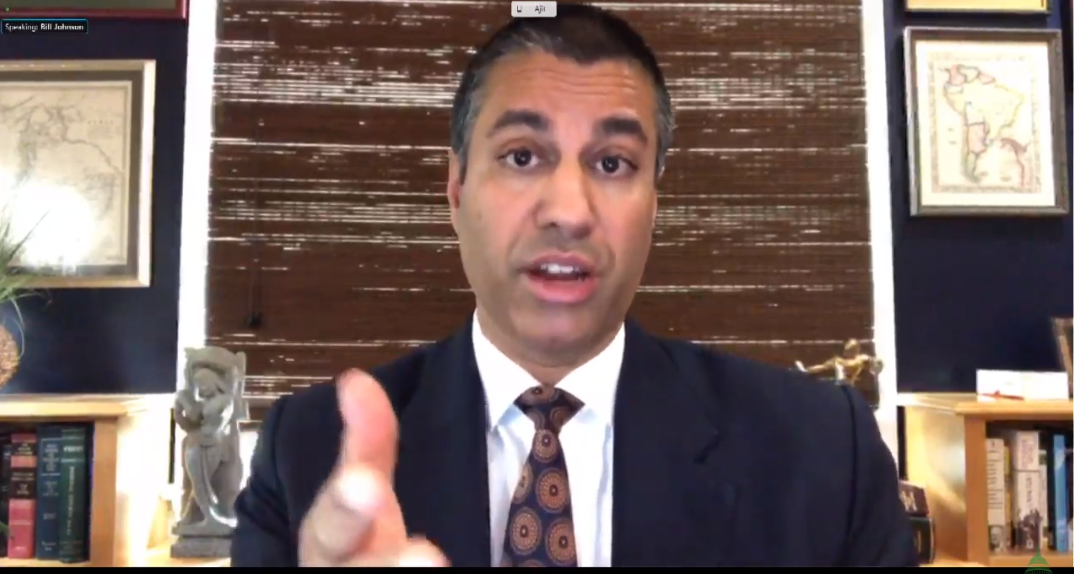FCC Hearing Highlights Partisan, Digital Divides
Democrats indict, Republicans defend FCC record

The smarter way to stay on top of the multichannel video marketplace. Sign up below.
You are now subscribed
Your newsletter sign-up was successful
A hearing in the House Communications Subcommittee that was advertised as a Democratic attack on (and expected Republican defense of) the FCC panned out as expected, with the Democrats using the hearing to make it clear it was also an indictment of President Trump as he seeks to be re-elected.
The hearing was as much about the partisan divide as it was the digital divide. That even extended to Republicans participating from the hearing room criticizing Democrats for appearing from their homes or offices rather than showing up in person.
Subcommittee chairman Mike Doyle (D-Pa.) said the country could not depend on the generosity of private companies to solve the connectivity crisis in a pandemic and the FCC had not seen fit to provide a national and coordinated plan to marshal federal resources. He said the Trump Administration and FCC priorities were misplaced and mismanaged.
Related: Pai Outlines FCC Accomplishments
While FCC chairman Ajit Pai's opening focused on what he said was the commission's successes, parent House Energy & Commerce Committee chairman Frank Pallone (D-N.J.) said those so-called accomplishments of the FCC majority were more like pandering to an administration that does not seem to care much about consumers.
He said the FCC had obliterated net neutrality regs that protected a free and fair internet, used official government processes to allow the Trump Administration to get back at Twitter to label one of his tweets as false, proposing drastic cuts to the lifeline broadband subsidy and using bad data to claim the digital divide was closing.
Pai did some pushback of his own, saying that one problem with improving the FCC's broadband maps was that the subcommittee had cut off funding for that effort, and that while he had asked Congress for money, it had done nothing. He said Congress had similarly done nothing to stop the FCC from having to reclaim T-band spectrum from first responders for auction, something the FCC has concluded should not happen. Doyle said the inaction was due to the Republican-controlled Senate, not the House.
The smarter way to stay on top of the multichannel video marketplace. Sign up below.
When he got his turn, Rep. Greg Walden (R-Ore.), ranking member of the parent committee, said he thought the hearing title: “TRUMP FCC: FOUR YEARS OF LOST OPPORTUNITIES," needed a fact check, saying it was "probably false."
He said rather than attack the President, the committee should rise above the rancor--which he called long on nasty quotes and short on facts--but that Democrats had put partisan politics first. He said the FCC "had done a lot, period." He was sitting in front of a poster board that said "Promises Made, Promises Kept," which included on telehealth funding, consumer protection and rural broadband.
He held up pages of accomplishments he said were too long to enumerate but he would enter into the hearing record, but did cite closing the digital divide, fighting illegal robocalls, and ending net neutrality regs that were burdensome and hindered resiliency, a resiliency that allowed networks to withstand the COVID-19 stress test.
Rep. Bob Latta (R-Ohio), ranking member of the subcommittee, took second chair in that FCC defense team.
He said that despite the COVID-19 challenges, the FCC and industry responded swiftly, pointing to the Keep Americans Connected Pledge, when the FCC asked the industry to keep their COVID-19 impacted subs connected.
Latta praised the FCC for quickly distributing $200 million in telehealth funding, and pointed to results in his district, where a healthcare provider who had been able to see 400-plus patients remotely was able to expand that to over 16,000.
Both Latta and Walden emphasized that the FCC had worked with, not against, industry and was able to secure expanded connectivity without heavy handed regulation.
Latta argued that one reason ISPs were able to handle the COVID-19-related increase in broadband use was due to the FCC's elimination of "misguided" net neutrality regs, which he said allowed ISPs to focus on building out infrastructure and launching voluntary public service programs.
Among the news out of the hearing:
1. Pai said the FCC is still on track for a Dec. 8 start to the C-Band auction.
2. Rep. Doris Matsui (D-Calif.) is working on legislation to establish a wireless internet agenda to encourage more effective use of spectrum.
3. Pai said that if there were no issues with revealing personal information and the FCC had the wherewithal, he would agree to try to make public all consumer complaints about problems with broadband access.
Contributing editor John Eggerton has been an editor and/or writer on media regulation, legislation and policy for over four decades, including covering the FCC, FTC, Congress, the major media trade associations, and the federal courts. In addition to Multichannel News and Broadcasting + Cable, his work has appeared in Radio World, TV Technology, TV Fax, This Week in Consumer Electronics, Variety and the Encyclopedia Britannica.

